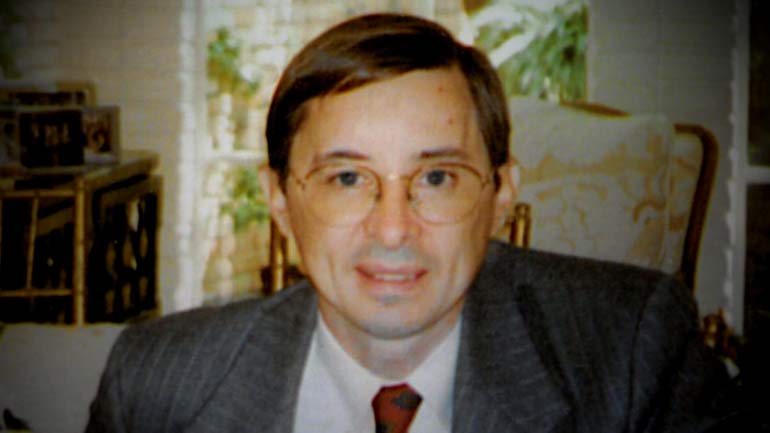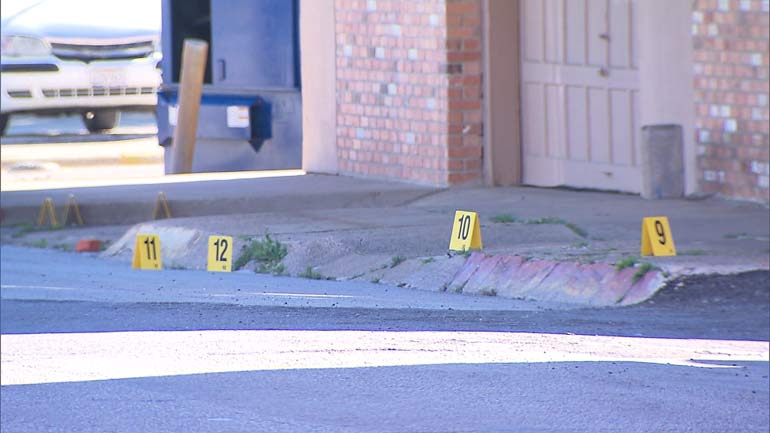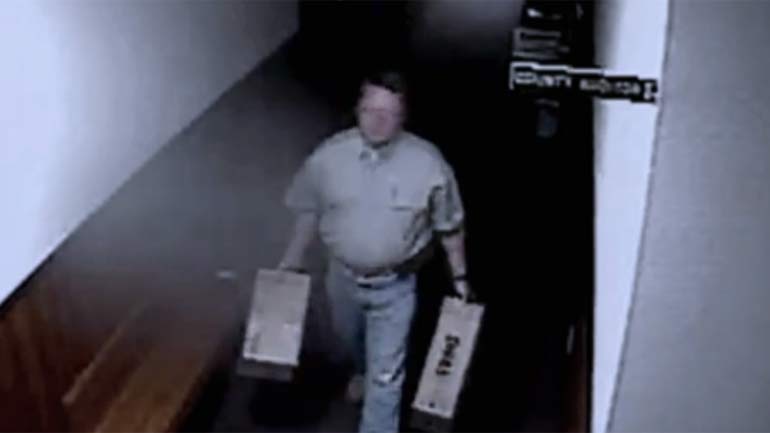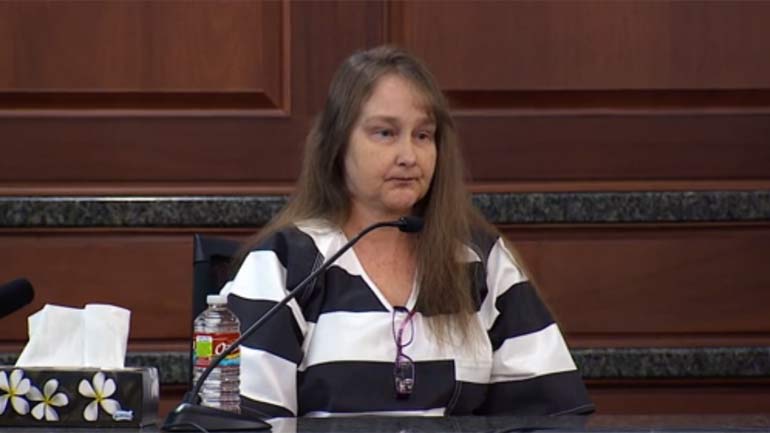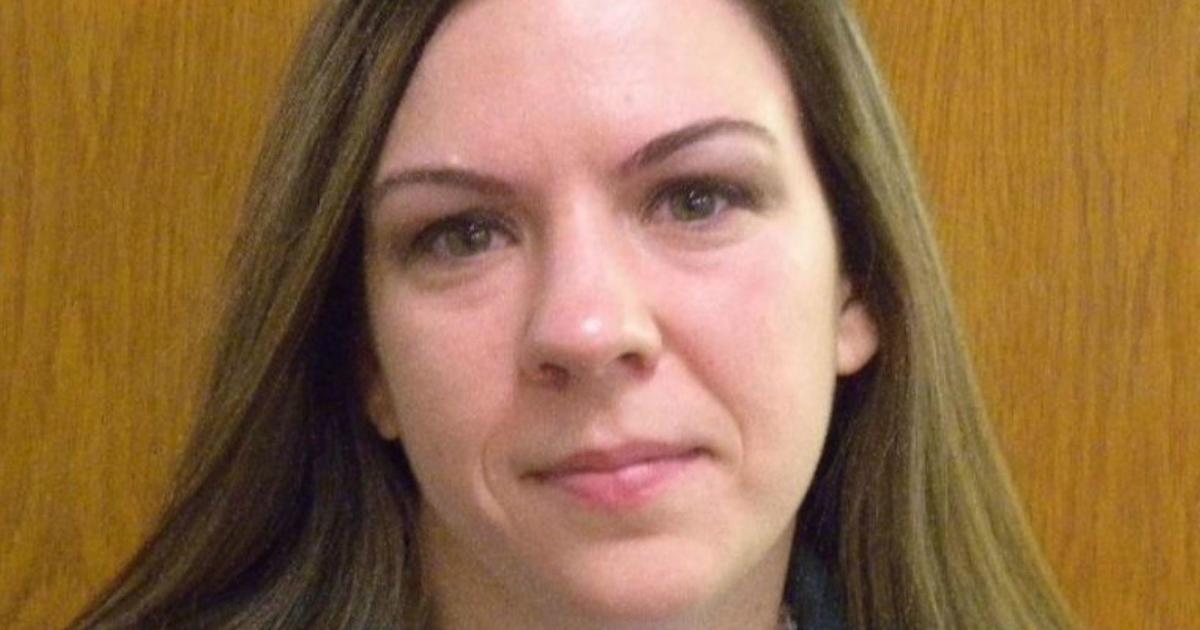Target Justice
Produced by Tom Seligson, Allen Alter and Susan Mallie
[This story first aired on Feb. 13. It was updated on Dec. 10.]
Thankfully, there aren’t many small towns or big cities that have gone through what Kaufman, Texas, has.
Mark Hasse, Kaufman’s assistant district attorney, was shot at 8 o’clock in the morning on a busy street just a block from the courthouse.
In this small town there was a huge turnout at the service for Hasse who was 57 and unmarried, but very well known.
Kaufman is just 30 miles from Dallas, but it’s a different world. It’s rural and until Jan. 31, 2013, quiet.
Lenda Bush and Kelley Blaine were headed to the courthouse that morning.
“I was driving up this road. I saw the shooter cross that street. And Mark was walking this way...” Bush, a lawyer and former police officer, told “48 Hours” correspondent Richard Schlesinger.
“When I first got out of my car, I heard a gunshot, so I turned and looked towards this direction,” said Blaine, a court coordinator.
Neither is a stranger to crime or criminals. But they were not prepared for what they saw and heard that morning.
“He shoved Mark ... Mark straightened up, shoved back and then he took the gun and shot right into his neck,” said Bush.
“What did he look like?” Schlesinger asked.
“He had on a ... black mask so it covered his face,” Blaine replied. “Couldn’t tell what he looked like, or his age at all.”
The gunman fired two final shots into the air and raced to his car.
Just then, Bush, the ex-cop, happened to be driving by on her way to work. She saw the shooting and the gunman whose face and body were completely covered. So Bush pulled in to try to read the license plate number on the shooter’s car but there was no license plate. The shooter took off, and so did Bush.
She followed the car for about three blocks. She tried to call 911, but she was nervous and she had a new phone so she fumbled and kept dialing 991, and the killer got away.
Bush hurried back to the crime scene where she was captured on a police car’s dashboard camera giving Hasse CPR.
“I gave CPR until the police officer came, and they took me aside and they said, ‘We’ll take it now,’” she said.
The identity of the masked murderer remained a mystery, but there was no disguising the impact of Hasse’s killing. Kaufman County Sheriff David Byrnes and Hasse’s boss, District Attorney Mike McLelland, had a press conference within hours.
“We’re in the process of running down many leads right now,” Sheriff Byrnes told reporters.
“It felt like a family member had died,” the sheriff said.
“My name’s Mike McLelland and I’m the criminal district attorney for Kaufman County. We lost a really, really good man. He was an excellent friend and a spectacular prosecutor,” the D.A. told the crowd.
Because Hasse was Mike McLelland’s chief deputy, special prosecutors had to be brought in. Dallas attorneys Toby Shook and Bill Wirskye took over one of the most important cases they’d ever had.
“And this was pretty unprecedented, I mean it was an attack on the judicial system the way we looked at it,” said Toby Shook.
“Killing a prosecutor is like killing a police officer. Another one is going to take his place,” Bill Wirskye said. “...and we thought we were the right ones to take Mark Hasse’s place, and get justice for the person that murdered him.”
Local police immediately began the hunt for the killer. Soon, state and federal officers swarmed Kaufman to offer help. It was up to Lt. Jolie Stewart of the Kaufman County Sheriff’s Department to help run the investigation. The first order of business was to find that getaway car.
“We knew we had a light colored maybe silver or tan sedan, four door, maybe a Ford Taurus. And that was gonna be our suspect vehicle. You just don’t realize how many cars fit that description till you start stopping them,” said Lt. Stewart.
Lenda Bush had told police everything she could remember, but it wasn’t much. So the Texas Rangers turned to a hypnotist to try to dredge up whatever was stored in her subconscious memory.
“Well, I’m always a little bit skeptical about things like that. But I was certainly willing to do it, if it would help,” she said.
Under hypnosis, Bush said there was an unusual pattern on the back of the car. That would help a lot before long, but it didn’t mean much then. Investigators were relying on more traditional police work.
“The mindset when you have a major crime like this,” Wirskye explained, “it is to reach out and touch every suspect you can as fast as you can and try to account for them.”
“And the accounts we were getting about how it happened, with the murder, getting up close with Mark, it just told me it was probably a grudge or a grievance this person had that was extremely personal,” he continued.
Mark Hasse was one tough Texas prosecutor. Over a long career he’d sent a long line of murderers, armed robbers, and drug dealers to the penitentiary. Some of them were free now, bearing grudges and bearing arms.
“We were literally swamped with suspects,” said Wirskye.
“This investigation, from day one, was like drinking out of a fire hose,” said Stewart.
There was one man right in Kaufman who police went to see right away. Eric Williams was a lawyer, and a justice of the peace, but he may well have had a motive to kill Mark Hasse. Williams had been caught and convicted of stealing computer monitors from a county office. The case had been prosecuted by Hasse.
“You know, it was common knowledge that he was not happy with that,” said Sheriff Byrnes.
“Sheriff Byrnes had detectives immediately go to his house,” said Shook.
“He comes to the door with his arm in a sling and claims that he had shoulder surgery,” said Sheriff Byrnes.
The deputies tested Williams’ hands for gunshot residue and found none.
“You know, we had -- had no reason to disbelieve him at that time. But we still -- you know, he was still on our radar,” said Sheriff Byrnes.
That’s when public attention soon started focusing on the white supremacist prison gang, the Aryan Brotherhood of Texas or ABT.
The ABT had just been front page news after a federal indictment charged members of the gang with murder and drug trafficking. The indictment had been sought by a group of prosecutors, including Mark Hasse.
And then there were other high-profile shootings of law enforcement officials by members of other White Supremacist gangs.
About two months after Hasse was killed, Evan Ebel, a member of the 211 Crew prison gang murdered the head of the Colorado prison system. Two days later, Ebel was pulled over on a lonely Texas highway by a sheriff’s deputy who thought something was suspicious about his car. Ebel shot the deputy and sped away, leaving the wounded officer in the grass. He led police on a high-speed chase through the Texas countryside, about 125 miles from Kaufman. He was finally stopped after hitting a truck and then was killed in a shootout.
It turns out that Evan Ebel wasn’t even in Texas on the day Hasse was killed. And while the white supremacists were getting all the headlines, investigators could not shake the feeling that they were spinning their wheels.
“The bottom line for those gangs is money, and killing a prosecutor, killing a police officer is just bad for their business,” said Wirskye.
But as the weeks went without an arrest or a major break in the case, the question became could whoever have killed Mark Hasse get away with it and even kill again?
A COMMUNITY IN FEAR
For weeks after the murder of Mark Hasse, investigators were drowning in information -- tips and leads that Sheriff David Byrnes says all went nowhere.
“Ninety-nine-point-nine percent of what we gathered was not helpful,” he said.
The sheriff and his team began eliminating some suspects with no possible links to the crime. They were convinced that neither the Aryan Brotherhood nor a drug cartel was involved.
“...in Kaufman County, we’re not prosecuting any cartel cases,” said Sheriff Byrnes.
Mark Hasse’s murderer was still on the loose. And everyone around the courthouse was looking over their shoulders wondering if they were safe or if they were next. Kelley Blaine works in one of the courts.
“One of the hardest things of all of that was helping my 70-something-year-old judge put on a bulletproof vest just so he could leave work and go home,” she said.
Hasse’s boss, D.A. Mike McLelland, always carried a gun, but J.R. McLelland says his father worried about people he worked with.
“And that was the thing about Dad. Bein’ the D.A. he felt responsible for everyone in that office,” J.R. McLelland told Schlesinger, adding that his dad was armed “all the time.”
In fact, he was seen on video at a local gun store looking for weapons for his staff.
And then, just hours after he went to the gun store -- and two months after Mark Hasse was shot down in broad daylight -- there was another, if possible, even more shocking killing.
KTVT News report: Tonight Kaufman County District Attorney Mike McLelland and his wife have been shot and killed in their Forney home.
It was a grisly killing. The district attorney and his wife were murdered at dawn in a hail of bullets.
“It was a bad, bad scene,” Sheriff Byrnes said. “Probably one of the worst two crime scenes I’ve ever been on because of the blood and the carnage.”
Cynthia McLelland was shot repeatedly, with one final shot to her head.
J.R McLelland was driving when he got the news about his father and stepmother.
“I got out of the truck, and -- stood there. I had my kids in there with me,” he said. “Didn’t know what to say, didn’t know what to do.”
He had to tell his sister, Krista Ball.
“I was shocked for two or three seconds. And I just broke down. The first thing you’d think of when you hear somethin’ like that is, you know, did-- how long did they suffer?” said Ball.
The murder of the McLellands meant the law enforcement community was now dealing with a serial killer who so far had set his sights on them.
“Was there any doubt in your mind that these two murders were connected with Mark Hasse’s murder?” Schlesinger asked.
“It was one of the first things that entered my mind when I got the call,” said Lt. Stewart.
“We knew that they were connected,” said Sheriff Byrnes.
County officials immediately got around-the-clock armed police protection. And Special Prosecutor Toby Shook took precautions even though he lived 30 miles away in Dallas.
“I had my wife take out two guns, told her what the situation was and not to open the door,” said Shook.
“Not even for a police officer?” Schlesinger asked.
“No. And I told her I would be texting her and calling her before I came back to let her know it’d be me comin’ through the door,” Shook explained.
“I wanted to think I knew that nobody was comin’ after any of us but ... the paranoia was crazy,” said J.R. McLelland.
After all the false leads since the Hasse murder, police got a significant and unexpected break just one day after the McLellands were gunned down. An anonymous tip came into a Crime Stoppers website. And the tipster’s opening line of his email: DO WE HAVE YOUR FULL ATTENTION NOW?
He -- or they -- certainly did.
“It was very specific as to the type of ammunition that was used in Mark Hasse’s death ... so somebody who had that much knowledge probably knew a lot more. So he was definitely somebody that we wanted to start a dialogue with,” said Lt. Stewart.
Whoever it was seemed to be taunting the police and in the email exchange on the Crime Stoppers website threatened to commit more murders. By now, with every other suspect eliminated, police turned their full attention to Eric Williams. He was the one-time justice of the peace who stole those computer monitors. He wasn’t hiding -- he was riding around town on a Segway. And he was talking to investigative producer Jack Douglas of CBS station KTVT .
“My heart goes out to all the families that have been affected by this tragedy. And especially to the people that work at the court house. I worked there for several years while I was going to law school and so I know that it’s a tight-knit family - that this is devastating to them,” Williams told Douglas.
“There was a coldness about him,” Douglas said of Williams.
“It didn’t look genuine to me,” Special Prosecutor Bill Wirskye said. “He looked smug, he looked like he was smirking and he just looked like a psychopath.”
“And what’s it make you feel like knowing that you’ve been somehow wrapped up in this?” Douglas asked Williams.
“It actually makes me feel [pause] that the police are doing the thorough job that they need to,” he replied.
Williams was right. The police were hard at work learning everything they could about him.
OUT FOR REVENGE?
Jenny Parks thought she knew Eric Williams pretty well and she liked him.
“Professionally, we were very friendly,” she said.
Parks, a local attorney in Kaufman County, has known Williams since he was a young court coordinator in town.
“Anything you needed done on that docket, he would make sure it got done or set,” Parks said. “So, I didn’t know of anyone that didn’t like him, you know, back when he first started practicing law.”
But everything changed in May 2011, just six months after Williams had been elected justice of the peace. That’s when he was caught repeatedly on surveillance video taking those monitors and other equipment from a county building. He said he needed them for his office. But within two weeks, he was arrested.
Lt. Evans: I don’t think that you actually believe-- I mean, you’re an educated person. I see your class ring on your finger. That you can just walk into a IT department and say, “I need a monitor. I’m takin’ that one.” I mean --
Eric Williams: There’s places that do that.
Lt Evans: Places being here in Kaufman County or --
Eric Williams: Well, I mean, there’s businesses that do that.
It was Mark Hasse and Mike McLelland who decided to prosecute Williams for the computer theft, a felony, and some people thought they had gone too far.
“I thought it was crazy,” Parks said. “I just know he wasn’t stealing them from the county -- misappropriating them ... he was going to use them for a legitimate purpose. I feel sure about that. He maybe didn’t go through the right channels to obtain them, because he didn’t get along with the person that allotted them.
There was even speculation that this was a political prosecution. Williams had supported McLelland’s opponent in the election.
“I don’t think my dad and Mark Hasse tried Eric Williams any different than they would have tried anybody else if they’d done somethin’ that broke the law and -- and had charges filed against them,” said J.R. McLelland.
And, in fact, prosecutors offered Williams a deal: plead guilty to a misdemeanor and avoid jail. He refused.
“He told me because it was all fabricated, and he would win, and there was nothing to worry about, and there was no problem. And he didn’t wanna have a misdemeanor on his record,” said Parks.
Eric Williams was a member of the international high-IQ society, Mensa. But his decision was not a very smart one. Williams went on trial and was convicted of a felony and it cost him almost everything he had worked for.
“Shortly thereafter, of course, he lost his right to be an elected, public official,” Parks explained. “...he lost his health insurance. He lost his law license, eventually, which meant his livelihood, his ability to provide for his family.”
“So he lost a lot?” Schlesinger asked.
“Yes, sir,” Parks affirmed.
“Didn’t go to jail?”
“No, sir. But he lost a lot, yes, sir,” said Parks.
And special prosecutor Toby Shook says Williams was out for revenge.
“... and the judge sentenced him to probation and the computer records show the next day on LexisNexis, he started searching Mark Hasse, where he lived and that sort of thing,” he said.
Tonya Ratcliff started hearing about Eric Williams from her close friend, Cynthia McLelland, the D.A.’s wife. They were both members of a quilting club. And she knows the McLellands were concerned about Williams ever since that trial.
“They told me about some of his history with having been prosecuted before and that they thought he had just the personality type that couldn’t stand being humiliated,” Ratcliff told Schlesinger.
“Did they think that he was humiliated?”
“Yes,” Ratliff replied.
And after Hasse’s murder, the McLellands were even more concerned.
“Did they feel like targets?” Schlesinger asked.
“Possibly. Yes, because they -”
“Did she ever say anything?” Schlesinger asked.
“Yes, she did tell me that she felt that Eric Williams was behind it and that they were going to take precautions at home to take care of themselves,” said Ratliff.
“Mike McClelland, from day one, minute one, knew that it was Eric Williams that had gunned down Mark Hasse,” said Wirskye.
That’s why sheriff’s deputies went to Williams’ house that day. They checked out his story that he had shoulder surgery and within days they determined he was lying. So why wasn’t Williams arrested then?
“For what?” said Sheriff Byrnes.
“Murder,” said Schlesinger.
“Well, where’s our evidence that he did it? We had no evidence. And - “
“He lied to the police about - “
“ -- that’s not an offense. It is federally. You can’t lie to a federal off -- you can lie to us all day. And quite frankly we kinda expect most people we talk to lie to us,” Sheriff Byrnes told Schlesinger.
They needed more. They needed Eric Williams, the man from Mensa, to do something dumb. And they were about to get lucky.
“...for being a self-proclaimed genius-- thinkin’ he was smarter than everyone, he made some -- some pretty stupid mistakes,” said Shook.
A BIG BREAK
After D.A. Mike McLelland and his wife, Cynthia, were killed, Texas lawmen knew any one of them could be next.
But even though they felt certain Eric Williams was their man, they didn’t have enough on him. So everyone was on edge -- especially at the courthouse.
News report: Some employees felt safer going into the building escorted by law enforcement officers. Others vowing to protect themselves packed a lunch and a gun.
And they were running out of time. Remember that anonymous Crime Stoppers tip? The tipster had threatened that the killings would resume soon.
“Then he made a threat that these assaults would continue unless a Kaufman County judge resigned by the next Friday,” said Toby Shook.
The police had to find the source of the tip before the fatal deadline. With the clock ticking, they found surveillance footage from businesses near the McLelland’s house taken around the time of the murders.
“We saw a white Ford Crown Victoria on different pieces of video footage, entering the neighborhood at about the right time and exiting it about the right time. So at that point, in addition to trying to interview Eric Williams, our focus was trying to find that white Ford Crown Victoria,” said Bill Wirskye.
Eric Williams had hired lawyers who prevented police from talking to him. Luckily for the police, that changed suddenly.
“We get an email on our phone from Eric Williams’ lawyers saying, ‘We no longer represent Eric Williams,’ and that was a big moment in the investigation, ‘cause we immediately realized he’s not represented by lawyers, so we can send officers over to attempt to interview him,” Wirskye explained.
But police still didn’t have enough evidence to get what they really wanted: a warrant to search inside the house where Eric Williams lived. They’d have to get his permission and that didn’t seem very likely. But Williams was full of surprises and when the police asked he said yes and invited them in.
“And that fits in with his psychopathic, egotistical mindset. He thought he could fool law enforcement in this case,” said Wirskye.
Armed with Eric Williams’ permission -- and several pistols -- Major Dewayne Dockery of the Texas Rangers and another officer entered the house, well aware that they were now alone with the man they believed had committed three murders.
“One of us had to be watchin’ him all the time because if he did have weapons in there, he would’ve known where they were. We wouldn’t have known where they were,” said Maj. Dockery.
The officers made an audio recording of the entire search. Because they had no warrant, they could only look for things where Williams allowed. But they saw enough. They found parts of weapons that could have been used in the murders. First, they found a gun sight.
“He had told me ... that sight hadn’t been on a gun. And I ask him about that,” said Dockery.
Major Dockery: This has been on a gun at one time...I mean it’s even got oil on it...It’s been cleaned and everything.
Eric Williams: Yeah. That doesn’t surprise me.
And they found another suspicious item.
“And I ask him about it, he said he didn’t know what it was,” Dockery said of the Heat Seeker 3500. “It’s a device that uses infrared technology to find heat signatures up to 900 feet away.”
Heat signatures can help find people. It was enough to get that warrant they wanted for a detailed search of the house. And they came back the next day with more manpower, including the FBI. They went through every inch of the house and they got very lucky.
“The biggest thing they found during the search is we found a title to a white Ford Crown Victoria,” Wirskye said. “ ...just validated what we thought, that we were on the right track, that Eric Williams was our killer, and we were gettin’ close to getting him.”
It was a huge break, but not the only one. In the entryway to the Williams house, police found a scrap of paper tucked inside a computer bag. There were some numbers scribbled on it. And it didn’t take long to figure out what they meant.
“When you call in a Crime Stoppers tip, you get a personal ID number ‘cause all that’s anonymous,” Sheriff David Byrnes explained.
“We contacted the administrator on Crime Stoppers. And ... we were able to find out that ... number was linked to that certain tip that we got,” said Lt. Jolie Stewart.
That tip was the one that correctly identified the ammunition used to kill Mark Hasse and threatened to kill again. It was enough to arrest Williams for something. And that very night he was arrested without incident at his home for making deadly threats. But there was still not enough to charge him with murder.
“We still hadn’t located the murder weapon, we hadn’t located the getaway car, and we were a little bit dejected after the search that we didn’t -- locate the-- the white Crown Victoria. One thing that happened during the execution of the search warrant is the media showed up and the search was carried on live TV,” said Bill Wirskye.
And that led to the biggest break yet. The morning after the search was televised, one viewer called Wirskye.
“It was a friend of Eric Williams, who told me, ‘Hey, I’ve got some information I think you need to know. I know about a secret storage place that Eric Williams has,” Wirskye told Schlesinger. “He told us that he had rented a storage unit on behalf of Eric Williams, because Eric Williams didn’t want his name associated with this storage unit, and he was able to lead us to that storage unit.”
Police quickly got a warrant for the unit that Williams secretly rented a few towns away.
“We had law enforcement just surrounding the storage unit, and we finally cut into the lock,” Wirskye explained. “Once we raised the door, there’s the white Crown Victoria.”
The Crown Victoria -- one of the crown jewels in the case against Eric Williams.
“...it was like Christmas morning and the Dallas Cowboys winnin’ the Super Bowl all rolled into one, and there were a lotta hugs and high fives,” said Wirskye.
“I told my wife this, that -- I said, ‘Other than the birth of my children, that was probably the best feel -- feeling I ever had.’” Maj. Dockery recalled with a laugh.
Besides the car was a boatload of weaponry: dozens of guns, thousands of rounds of ammunition, police badges, bulletproof vests and a crossbow.
“That locker was-- a tactical officer’s dream,” said Lt. Stewart.
And it was more than enough for the detectives. So on April 18, 2013, almost three weeks after the McLellands were killed, Eric Williams was charged with capital murder for shooting them and prosecutor Mark Hasse.
But it turned out Williams did not act alone.
MOTIVE FOR MURDER
In December 2014, 20 months after being charged with murdering D.A. Mike McLelland, his wife, Cynthia McLelland, and prosecutor Mark Hasse, Eric Williams went on trial in front of people who used be his courthouse colleagues.
It had been a long and difficult investigation, and now prosecutor Bill Wirskye could finally tell everyone in the courtroom it was Eric Williams who shot down their friends for revenge after being prosecuted for stealing those computer monitors.
“He begins to plot, he begins to plan,” Wirskye told the court. “...to seek vengeance. Fatal and final retribution...”
This case was undeniably personal to Wirskye. And he got up close and personal to Williams when he said Williams killed Cynthia McLelland because she was in the way.
“She died because she was married to Mike McLelland and she died because this man didn’t want to leave a witness to a murder!” the special prosecutor said in a raised voice as he pointed to Williams.
Prosecutors had a ton of evidence: the weapons stockpile, the Crown Victoria, police uniforms and badges, and compelling witnesses.
Dallas police officer Charles Tomlinson was the first at the McLelland’s house that night.
“She was just layin’ on the ground. And the dried blood, coagulated blood,” he testified.
Tomlinson had been down the street visiting his parents, who were good friends of the couple, and they followed him to the crime scene.
Charles Tomlinson: My parents were behind me and my mom immediately hit the ground.
Special prosecutor Bill Wirskye: And when you say hit the ground, describe what you’re talkin’ about.
Charles Tomlinson: She just fell to her knees and started crying.
The defense made no opening statement and called no witnesses. Mike McLelland’s son, J.R., and daughter Krista looked on as Williams’ lawyer made the case that the prosecution had not made its case.
“Eric Williams did not commit these murders. There’s not one single piece of biometric evidence that ties Eric to the McLelland home. Not one fingerprint, not one piece of DNA, not one hair, nothing,” defense attorney Matt Seymour told the court.
The jurors seemed to decide not only was there no reasonable doubt, there was no doubt at all -- they took just an hour and 40 minutes to reach a verdict, finding Williams guilty of capital murder.
But some of the most shocking testimony would come in the sentencing phase of the trial, where the jury would decide if Williams would get the death penalty. It was the debut of a star witness.
Eric Williams’ wife of 16 years, Kim, had also been charged with all three murders. She admitted she drove the getaway cars after all the killings.
Special prosecutor Bill Wirskye: Were you a willing participant in these murders?
Kim Williams: Yes, I was.
Kim Williams had since filed for divorce and said she took part in the murders because she was addicted to pain killers.
Special prosecutor Bill Wirskye: Tell the members of this jury what you were addicted to. Kim:
Kim Williams: OxyContin, morphine, valium, Provigil -- a lot of stuff.
The soon-to-be ex-Mrs. Williams confirmed her husband’s motive for murder was anger -- fury, really -- that he was convicted for stealing those computer monitors.
Special prosecutor Bill Wirskye: Why did you agree to drive to the murder of Mark Hasse?
Kim Williams: I was so drugged up and I so believed in Eric and everything that he told me. His anger was my anger.
Remember Lenda Bush, the ex-cop who witnessed the shooting? She recalled under hypnosis the shooter’s car had a strange pattern on the back. It turns out, the getaway car Eric Williams used after the Hasse murder had a strange pattern right where Bush remembered.
It was paw prints. The former owner had been a cat lover.
After the Hasse murder, the car broke down and didn’t last long enough to use in the McLelland murders.
“He wanted to use the original car that we used for Mark Hasse but the transmission blew, couldn’t use it,” Kim Williams testified.
Kim said that’s why Williams bought that white Crown Victoria. And she said he dressed up like a police officer to dupe the McLellands into letting him in the house. She also said after killing the McLellands, she and Eric celebrated.
Kim Williams: We had barbeque steaks, but we had steaks on the grill and Eric cooked those.
Special prosecutor Bill Wirskye: What was the mood like at the cookout?
Kim Williams: Happy, joyous.
And Williams was also, apparently, not finished.
Special prosecutor Bill Wirskye: After the McLelland’s were killed, were there more on the hit list?
Kim Williams: Yes.
Kim Williams said judges would have come next, specifically the one who’d mentored Williams and urged him to take that plea deal in the theft case.
“And he bought a cross bow with razor tips,” Kim Williams testified.
Among all the items found in the storage unit, one of the most puzzling and chilling had been homemade napalm stored in of all things, pickle jars. Kim Williams said it was meant for the judge.
“He was gonna wait for him and shoot him with a crossbow and then bore his stomach out and put the napalm in it,” she said on the stand.
Kim Williams’ testimony might well have sealed her husband’s fate, but Mike McLelland’s family wanted a chance to talk to him. His son and daughter did not hold much back.
“You’re a sorry S.O.B. and we hope you rot,” said Krista Ball.
“I wish you could look me in the eye right but you can’t,” said J.R. McLelland.
J.R. heard how Williams had celebrated after killing Mike and Cynthia and taunted him.
“Tonight, while you’re eating a baloney sandwich, I’m going to have steaks, ribeye, baked potatoes, a big fat glass of sweet tea,” J.R. addressed Williams. “And I’ll be there to watch you die along with the rest of my family.”
And Cynthia’s daughter, Christina Forman, might have given the kind of sendoff most people in Kaufman would have wanted for Eric Williams:
Christina Forman: Pretty much the only thing I have to say is f*** you Eric Williams ...
Judge: C’mon ma’am.
Christina Forman: My apologies to the court ... anyway, I hope you get exactly what you deserve.
Eric Williams was sentenced to death.
Judge: The people of Kaufman County, I know you’ve been scared for the last couple of years, no reason to be scared anymore. We’re in recess.
“He always thought, and probably still today thinks, that he’s the smartest person on the face of the earth,” said Bill Wirskye.
“But look where he is now,” Schlesin ger commented.
“Exactly, he may be the smartest man on Texas Death Row,” said Wirskye.
Kim Williams pleaded guilty and was sentenced to 40 years in prison.
“What did you expect justice to feel like?” Schlesinger asked J.R. McLelland.
“I guess you expect it to feel like this big ball of relief just rolls over you. And everything is good now. And that everything was terrible and now everything’s great,” he replied.
“And what did it feel like?”
“It felt no different,” J.R. replied.
It was the outcome the McLellands wanted and needed. But justice can only take a person so far. It’s still up to the McLellands, like all survivors, to find a way to move on and move past the trial and the tragedy.
“Dad wouldn’t want us to sit and grieve him forever,” J.R. McLelland said. “So, you pick up, you go on. And ... start livin’ life again. ...But I don’t think it’ll ever be easy.”
Eric Williams’ request for a new trial was denied; he has filed for a stay of execution.
It can take more than 20 years of appeals before an execution.
